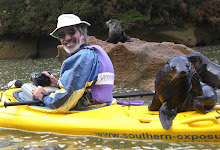The white wooden desk where I study when I'm in Kino Bay, Sonora sits is in a nook in the bedroom facing a window. It overlooks an estuary. There is a parking lot between my room and the estuary and there are a couple of poles in the lot. It feels good to be here and it is good for daydreaming and just getting generally distracted.
Yesterday I was at the desk alternating with trying to get an intuitive feel for functions and trying how to enter, graph, and interpret functions with my new TI-84 calculator when I looked out and noticed an osprey land on the pole nearest to my window. That was more interesting than f(x)=some equation with strange symbols in it.
After a few seconds, another osprey came up behind it and the first one took flight making room for the new one. Soon four osprey were playing a noisy game of musical chairs with that one pole as the prize. They circled high above the estuary, seemed to confront each other, and then one would land on the pole, just to be moved off by the next bird to take a turn.
I couldn’t tell whether it was simply a game – teenage osprey just hanging out -- or if something more violent was going on. There didn’t seem to be anything real at stake. No fish, no nest. Just fifteen or seconds of squatting rights on a random white pole in a parking lot.
After about 30 minutes and a couple of photographs, I forced myself to turn back to my algebra book. But first I wondered whether mathematicians could even begin to describe the beauty of a bird’s flight or the playful interaction I had just watched from my window. Then I thought, if they can, I want to learn how. But if they can’t, then maybe math is nothing more than a tool for engineers and accountants, a tool that I don't really need.
But then, if I hadn’t been learning about how to plot a quadratic function, I wouldn’t have seen that dance in the sky in the first place.
Here are two of the pictures I took.
After about 30 minutes and a couple of photographs, I forced myself to turn back to my algebra book. But first I wondered whether mathematicians could even begin to describe the beauty of a bird’s flight or the playful interaction I had just watched from my window. Then I thought, if they can, I want to learn how. But if they can’t, then maybe math is nothing more than a tool for engineers and accountants, a tool that I don't really need.
But then, if I hadn’t been learning about how to plot a quadratic function, I wouldn’t have seen that dance in the sky in the first place.
Here are two of the pictures I took.


